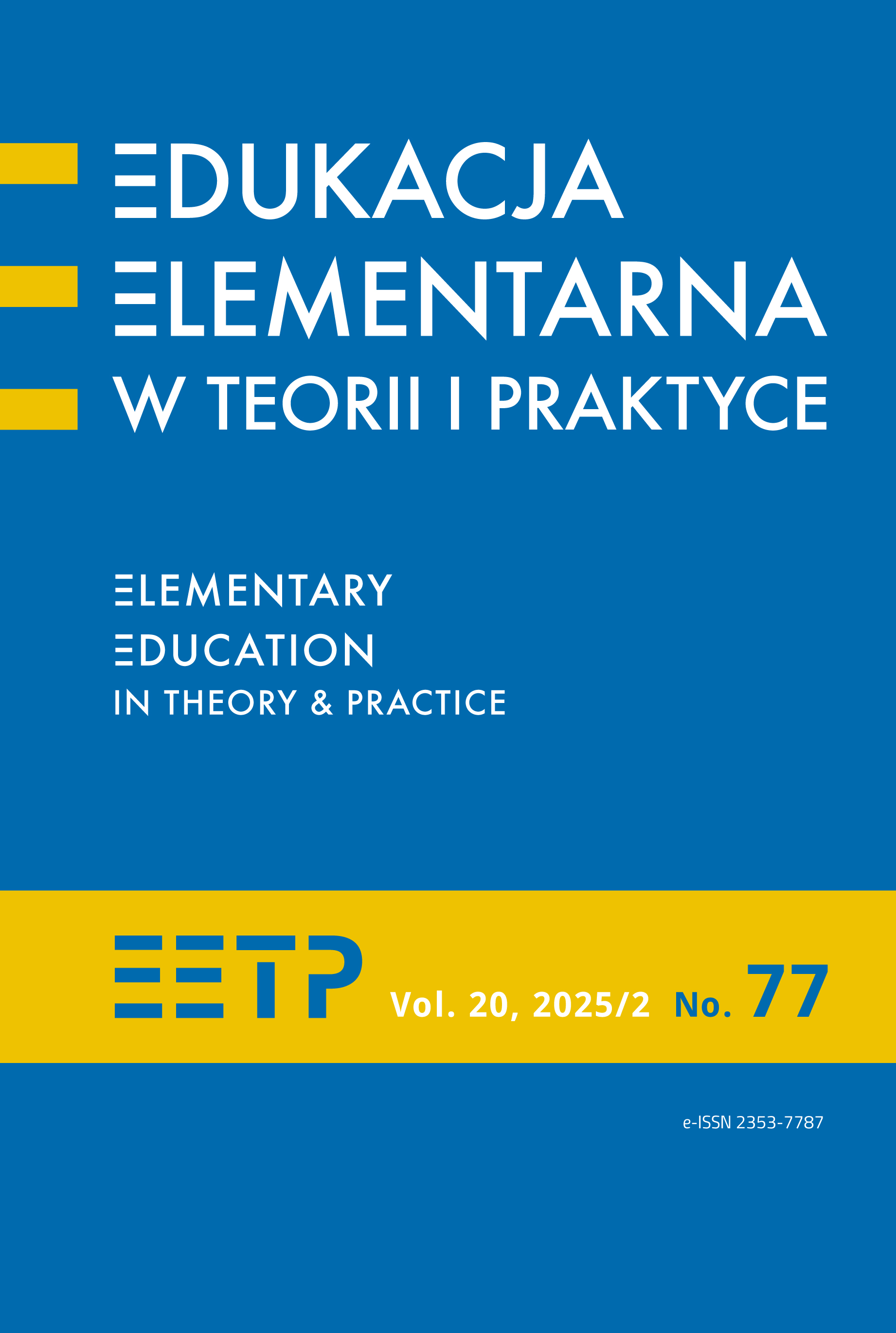The Importance of a Growth Mindset for the Well-Being of Children at Early School Age
Abstract
The aim of this article is to demonstrate the importance of a “growth mindset” for the well-being of children at early school age. It is indicated that the formation of beliefs in children that foster perseverance, self-motivation and a constructive approach to failure is important for their emotional and social functioning. The theoretical basis is the concept of growth mindset by Carol S. Dweck.
The results of author’s own research among pupils in grades I–III (N = 220) are also presented, which reveal a tendency for growth mindset to decline with the subsequent years of children’s schooling.
The article also presents a project entitled “Mógoki – How to work with children on perseverance”, which supports teachers in developing perseverance, coping skills, and motivation to learn in children.
The conclusions emphasise the importance of informed support from adults – teachers and parents – in developing a growth mindset in children. Recommendations for educational practice include the use of constructive feedback, promoting the value of effort and creating an environment conducive to learning through mistakes and challenges, which is crucial for children’s mental wellbeing.
References
Bandura, A. (1977). Self-efficacy: Toward a unifying theory of behavioral change. Psychological Review, 84(2), 191–215. https://doi.org/10.1037/0033-295X.84.2.191
Bandura, A. (1997). Self-efficacy: The exercise of control. W.H. Freeman and Company. https://www.academia.edu/28274869/Albert_Bandura_Self_Efficacy_The_Exercise_of_Control_W_H_Freeman_and_Co_1997_pdf
Bandura, A. (2007). Teoria społecznego uczenia się (J. Kowalczewska i J. Radzicki, tłum.). Wydawnictwo Naukowe PWN.
Blackwell, L.S., Trzesniewski, K.H. i Dweck, C.S. (2007). Implicit theories of intelligence predict achievement across an adolescent transition: A longitudinal study and an intervention. Child Development, 78(1), 246–263. https://doi.org/10.1111/j.1467-8624.2007.00995.x
Bulkowski, K., Dobosz-Leszczyńska, W. i Kaźmierczak, J. (2023). Umiejętności polskich piętnastolatków. Najważniejsze wynik badania OECD PISA 2022. Instytut Badań Edukacyjnych. https://ibe.edu.pl/images/badania/PISA2022/PISA2022_najwazniejsze_wyniki_badania.pdf
Cambridge University Press. (b.d.). Mindset. W: Cambridge Dictionary. Pobrano 21 maja 2025 z: https://dictionary.cambridge.org/dictionary/english/mindset
Czapiński, J. (1994). Psychologia szczęścia. Przegląd badań i zarys teorii cebulowej. Pracownia Testów Psychologicznych PTP.
Duckworth, A. (2016). Upór. Potęga pasji i wytrwałości (P. Cieślak, tłum.). Galaktyka.
Dweck, C. (2021). Nowa psychologia sukcesu. Nastawienie na rozwój to gwarancja sukcesu (A. Czajkowska, tłum.). Muza.
Franken, R. E. (2006). Psychologia motywacji (M. Przylipiak, tłum.). Gdańskie Wydawnictwo Psychologiczne.
Goleman, D. (2023). Inteligencja emocjonalna (A. Jankowski, tłum.). Media Rodzina.
Hattie, J. (2015). Widoczne uczenie się dla nauczycieli. Jak maksymalizować siłę oddziaływania na uczenie się (Z. Janowska, tłum.). Biblioteka Szkoły Uczącej się.
Lendowska-Kidoń, T. i Wosik-Kawala, D. (2014). Rozwijanie poczucia własnej wartości u dzieci w młodszym wieku szkolnym. Oficyna Wydawnicza „Impuls”.
Leszcz-Krysiak, A. (2022). Inspiratorium. Jak pracować z dziećmi nad wytrwałością. Regionalny Ośrodek Metodyczno-Edukacyjny „Metis”.
Leszcz-Krysiak, A. (2024). Talent to (nie) wszystko – czyli o tym jak dzieci postrzegają znaczenie zdolności i wysiłku: Doniesienie z badań. W: E. Stokowska-Zagdan, E. Woźnicka i G. Cęcelek (red.), Uczeń w szkolnej przestrzeni. Uczenie się i wyrównywanie szans edukacyjnych (s. 209–224). Difin.
Mueller, C.M. i Dweck, C.S. (1998). Praise for intelligence can undermine children’s motivation and performance. Journal of Personality and Social Psychology, 75(1), 33–52. https://doi.org/10.1037/0022-3514.75.1.33
Ryff, C.D. (1989). Happiness is everything, or is it? Explorations on the meaning of psychological well-being. Journal of Personality and Social Psychology, 57(6), 1069–1081. https://doi.org/10.1037/0022-3514.57.6.1069
Seligman, M.E.P. (2011). Pełnia życia. Nowe spojrzenie na kwestię szczęścia i dobrego życia (P. Szymczak, tłum.). Media Rodzina.
Smak-Drewniak, A. (2022). Mógoki. O tym, że warto być wytrwałym. Regionalny Ośrodek Metodyczno-Edukacyjny „Metis”.
Sternberg, R.J. i Speat-Swerling, L. (2003). Jak nauczyć dzieci myślenia (O. Kubińska i W. Kubiński, tłum.). Gdańskie Wydawnictwo Psychologiczne.
Syrek, E. (2019) Zdrowie psychiczne, higiena psychiczna – edukacja dla dobrostanu psychicznego – aktualność koncepcji i poglądów Kazimierza Dąbrowskiego. Pedagogika Społeczna, 18(3/73), 223–235. https://rebus.us.edu.pl/bitstream/20.500.12128/12421/1/Syrek_Zdrowie_spychiczne_higiena_psychiczna.pdf
Copyright (c) 2025 Elementary Education in Theory and Practice

This work is licensed under a Creative Commons Attribution-NoDerivatives 4.0 International License.
- When submitting a text, the author declares that he/she is the Author of the article (hereinafter referred to as the “Work”) and:
- he/she owns the exclusive and unlimited copyright to the Work,
- is entitled to dispose of the copyright to the Work.
Declares that it does not infringe any third party copyrights or legal rights.
Declares that there is no conflict of interest.
2. At the same time, the Author grants the Ignatianum University in Cracowa royalty-free, non-exclusive and territorially unlimited licence to use the Work in the following fields of exploitation:
- recording the Work in a hard copy, as well as on a digital or magnetic medium;
- reproduction of the Work using any technique, without limitation of the number of editions or copies;
- distribution of the Work and its copies on any medium, including marketing, sale, lending, and rental;
- introduction of the Work into a computer memory;
- disseminating the Work in information networks, including in the Internet;
- public performance, exhibition, display, reproduction, broadcasting and re-broadcasting, as well as making the Work available to the public in such a way that everyone can have access to it at a time and place of their own choosing;
- within the scope of dependent rights to the Work, including in particular the right to make necessary changes to the Work resulting from editorial and methodical development, as well as to translate the Work into foreign languages;
The licence is granted from the moment of the transfer of the Work to the Ignatianum University in Cracow. The Ignatianum University in Cracow is entitled to grant further sub-licences to the Work within the scope of the right granted. The licence is time-limited and it is granted for a period of 15 years, starting from the date of its granting.
Authors are permitted and encouraged to publish their text online (e.g. in their institution’s repository or on the institution’s website) before or during the submission process as this may lead to beneficial exchanges, as well as earlier and greater citation of the published text (See The Effect of Open Access). We recommend using any of the following portals of research associations:
- ResearchGate
- SSRN
- Academia.edu
- Selected Works
- Academic Search




